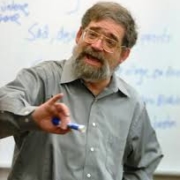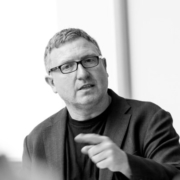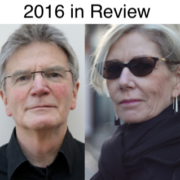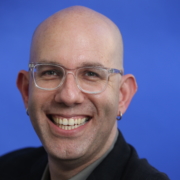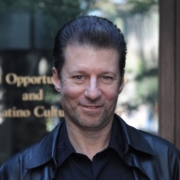Social movements produce a huge amount of intellectual knowledge. Yet, in many academic circles, this knowledge is overlooked. Aziz Choudry has spent most of his life working with social movements around the world. He is currently an associate professor in the Department of Integrated Studies in Education at McGill University and visiting professor at the Centre for Education Rights and Transformation at the University of Johannesburg. His newest book Learning Activism: The Intellectual Life of Contemporary Social Movements was published in 2015 by the University of Toronto Press. All book proceeds will be donated to the Immigrant Workers Centre in Montreal.
Learning Activism is designed to encourage a deeper engagement with the intellectual life of activists who organize for social, political, and ecological justice. Professor Choudry is concerned with “making visible the dialectical relationship between ‘Research’ and ‘organizing.’” Will Brehm spoke with Aziz Choudry in mid January about his new book.
Citation: Choudry, Aziz interview with Will Brehm, FreshEd, 14, podcast audio, February 8, 2016.https://freshedpodcast.com/azizchoudry/
Will Brehm 1:12
Aziz Choudry, welcome to FreshEd.
Aziz Choudry 1:15
Thanks for having me, Will.
Will Brehm 1:17
In your newest book called Learning Activism, you write in the preface about your interview at McGill University, and you talk about bringing a briefcase of all this material that you’ve produced over the years during your time in various social movements. What is your background in activism and social movements?
Aziz Choudry 1:40
Sure, Will. I mean, I currently work as an associate professor in the Department of Integrated Studies in Education at McGill University. And I, however, kind of started out in the academic world, so to speak, apart from one year when I did a one year of an undergraduate degree a long time ago, which I didn’t complete, relatively recently. And after many years of being involved as an organizer, as an activist, as somebody who is a researcher as well within a range of different organizations in Aotearoa, New Zealand, particularly, and in the border Asia Pacific. I was very involved with what was to later become known as the anti-globalization movement, or the Global Justice Movement, but also very active in support for indigenous peoples sovereignty struggles, struggles throughout the Pacific, for example of in East Timor, Bougainville, West Papua and struggles around the kinds of issues that people, I think, in many countries around the world, North and South, have been fighting in the wake of whatever we want to call it -global capitalism, or neoliberalism, privatization, the impacts of neoliberal capitalist policies in a small country like Aotearoa, New Zealand, which, after 1984, in particular, was kind of turned into a bit of a Petri dish for testing out applying directly some really wild forms of free market capitalism on a country at the time about 3.4 million people. So, in the course of all of that, I was involved with a lot of different kinds of small-scale, local activism, if you like, around the impacts on the ground. Working with, often supporting trade unions who were struggling around the impacts of what happened when you kind of opened up a small country to transnational corporations with the impacts on both public sector and private sector workers. The loss of jobs, the grinding down of working conditions, etc., etc. So, out of there and in the course of that, I was involved with international and local coalitions of nongovernmental organizations (NGOs), social movements, and a lot of the kinds of concerns and questions and ideas that came out of that period of activism prior to actually going into graduate school, or becoming a university academic, very much propelled the kind of questions and the kind of work that I continue to do in the academic world. So, when I turned up there for a job interview, yes. I brought -actually, it wasn’t a briefcase. It was kind of quite a large wheelie suitcase of all kinds of publications, bulletins, and things like that. Many of which -I was talking with somebody recently about the pre-Google era and the pre-internet era. And a considerable number of those things were produced prior to when all kinds of things ended up online. And I think, again, lots of questions come out in the course of thinking about the academic world and thinking about the intellectual work that takes place in the everyday organizing, or the campaigns, or the sort of incremental learning that takes place in organizing and activism for social change or environmental justice. A lot of that stuff is actually invisible. It’s not necessarily always the stuff that will end up being used by or referred to in books on social movements, or in books about organizing, or in films, etc., etc. And so those kind of questions about whose knowledge gets recorded and under what circumstances. And also thinking about how activists and organizers relate to and draw upon history of earlier experiences of struggle remained very central to the kind of work that I’m continuing to do now.
Will Brehm 6:27
Did you find it difficult to make the transition from the vast experiences you’ve had in social movements to the academy?
Aziz Choudry 6:35
Well, I mean, in terms of sort of a transition, I don’t think I ever -for me, doing a PhD was a way of pulling back from, rather than retreating from the political commitments that I have. And so, I’ve never sort of put aside those political commitments or those engagements and sort of, “become an academic”. I mean, that’s very much remained part of who I am and what I do. I think the academic world and universities, and sort of scholarly communities: on the one hand, there are these kinds of rules and protocols and so on that some might say as being very specific, or perhaps somewhat peculiar to people from the outside. I think, on the other hand, there have always been people -perhaps not enough, in my view- people who work in universities, who’ve been committed to whatever it is, seeing their work, whether it’s about their research work, or whether it’s other things that they do in their life. A strong commitment to social justice and social change. However, on the other hand, I think universities tend to be inherently conservative kinds of institutions, and for all kinds of reasons. I think that with the sort of managerialism that we see coming into universities now, with this sort of very competitive ethos that is the dominant form of certainly North America, and what I’ve seen in other places too. A very commodified kind of approach to education and scholarship. That yeah, I mean, there’s some real forces that that one might be up against if you’re saying, Well, I think that universities should be socially relevant to all peoples in society, that they should be accessible. That the knowledge that is produced in them should also be accessible. And I mean, that’s a huge issue in an era of academic journals that are run as sort of pay-per-view businesses unless you’ve got a subscription through your institution. Which I think is one of the reasons why doing these kinds of things like you’re doing, Will, is really neat because there’s a sort of a way of actually being able to open up access to people, to whoever wants to tune in. But there is at the same time, I think, pockets of resistance or people within universities -that’s including students, that’s including faculty, and it’s also including non-academic staff too who are very much the people who keep these universities running- that are committed to a sort of a progressive vision of education. But that’s a struggle. And I mean, that’s remade and that’s kind of waged every day in different kinds of ways.
Will Brehm 10:08
Well, thank you for including my show in that list. I mean, I guess there are definitely different values that different people in academics place on the different journals. You know, there’s some journals that are better than others. And I guess, open-source journals are definitely facing an uphill battle in some regards because they’re not deemed as valuable. And I would imagine, my show is also included in that. It’s maybe not as academic as a journal.
Aziz Choudry 10:42
Yeah, I mean, I think it depends on -I think some of that is changing in terms of open-access journals. I mean, I think it’s becoming quite -certainly in the education, social sciences and humanities- where if you want to see the kind of the work that you’re doing being in peer-reviewed journals, therefore journals, that sort of, “count as being scholarly journals”, then there’s a fair number, I think, that are becoming open-access. I mean, on the other hand, yes, you do have those sort of established, proprietorial, kind of very capitalistic journal companies that are run as corporations. I mean, they are corporations. And so, yeah, you’re sort of competing against there, and then whatever, within the different countries that people work in, the different rules and regulations too that come down sometimes from ministries of education, or universities about which journals count. But I think some of that is sort of changing. And I guess the other thing for me is, I don’t think it’s just about those of us in the university that are doing our annual reports, and sort of counting how many beans we kind of served up during the past year. I also think it’s about whether or not those journals, whether or not some of that research is actually accessible to people outside of universities. I mean, I work in a public institution, so it’s a public university. So, I mean, there’s an argument there, I think that there should be some accountability back to broader communities and societies about what it is we’re all doing in these -I don’t want to use the cliche ivory towers. Well, I just did. But you know, there needs to be ways that some of that research can be accessible. Now, of course, vast amounts of that may be not particularly useful to folks but on the other hand, it’s a common kind of request as somebody who’s politically engaged in lots of things. It’s about being able to access some of that knowledge for specific kinds of struggles and so on.
At the same time, as I think that a lot of the intellectual work of social movements or struggles happens under the radar, so to speak. It happens outside of very often formal research or educational contexts. And I think that’s something that’s interesting to consider too is that just as universities exist in a set of capitalist relations and in the same way, all of us that live in these societies are struggling with capitalist relations, with contradictions that exists because of that. So, that includes nongovernmental organizations, that includes trade unions, that includes activist groups, and so on. So, all that is to say I don’t think that they are any kind of pure spaces that are untouched by those social relations. What I do think, though, is that all knowledge is partial. And I think if we are aware of some of the intellectual work that takes place in the course of everyday struggles, and the sort of work that’s happening, whether it’s been well documented or not, we can see that there’s a real, I think, richness. A real kind of set of conceptual resources for thinking through and thinking about the world that we’re in. And kind of the challenges and the necessities, I think also for change that come out of informal, non-formal kind of spaces. That could be organizing meetings, you know, the Immigrant Worker Center here in Montreal, which I’m on the board of. It could be the kinds of conversations that people have over designing a poster that they’re going to paste up around town. It could be the kind of conversations that people have in the course of just outreach work, flyering people about whether it’s worker rights. It could be being on a demonstration. All of those places, all of those spaces are where people think people come together. And people, I think, in a collective sense, can sometimes stand back, reflect upon what it is that they’re doing. And out of that kind of incremental, informal kinds of processes, I think, can come some really quite rich insights into how the world’s put together and what it might take to challenge some of that.
Will Brehm 16:31
And the goals of producing research in the various social movements that you’re speaking of, in a sense, they’re different than the goals of producing research out of the academic community?
Aziz Choudry 16:48
Well, I mean, yes, and no. First of all, I think it’s quite hard to, sort of, generalize about either of the kind of university-based research that’s located somewhere in the university or supported through academic funds and research that takes place in social movements. I mean, they’re both -the kinds of research that takes place, I think, in social movements, and I talk about this in the book- it’s quite diverse. There’s not a particular model, it’s very much about context. I mean, sometimes it is about, hey, look, we’ve got this transnational corporation that is taking over the provision of X service in our city or in our area. We’re concerned about this because of lack of accountability, and its track record elsewhere, and that we think that this should be in public hands, and so on, and so forth. And so, people start sort of digging around. And I think a lot of the kind of informal networks that I’ve been part of, have been as important as sort of more formal organizational affiliations when it comes about doing that. After you ask around, you start from a problem that either you’re facing or your community’s facing or people that you’re working with, you’ve been asked to do this work. And I mean, that has often been the case. In some cases, social movements in different parts of the world have said, hey, you know, we really need you, you, and you to do some research. So, we’re going to figure out some ways to free up your time, and make sure that you can eat in order to do that kind of work. I think, currently, that that sort of work takes place. In certain ways, I think, you see that kind of process happening in a number of countries where -I mean, the Philippines, for example, in some of the movements that I’ve been talking about in the book, where you do have organizations that are sort of dedicated to research or a couple of people in an organization who are kind of dedicated to doing research. But on the other hand, you also have people say, Yeah, I mean, you know, I’m kind of doing a bunch of different things. I’m an organizer, I’m a media person, I’m a researcher. The way things work within the movement is you can’t be just any one of those -you know, one role like that.
And I think that obviously, what you don’t have in a lot of social movement settings is the same kinds of rules, I suppose, about how you peer-review and the certain kinds of protocols that academics are supposed to follow. On the other hand, I’d argue that a lot of research that takes place in social movements is highly rigorous. And in fact, the costs of getting things wrong are often much higher than a cost to an individual academic researcher, any university, if they “get it wrong”, or make a mistake because of the real consequences of: you know, there’s activists who do research in the UK were reminding me about British libel laws. You know, of companies threatening -and this has happened a number of times, many times- companies threatening activists over leaflets or articles or statements that have been made about them, of the kinds of risks and threats that exist to activist researchers in places like the Philippines, which are literally about being killed by paramilitaries, by the safety of researchers in the field, in the context of a highly militarized, if you like, a kind of a silent war on dissent on the left in the Philippines. And then there’s a lot of internal checking very often that happens. People will be bouncing drafts back and forth to people if it’s a written document. Checking out with networks and saying, is this right, does this seem relevant, does this work? And so, a lot of those kind of processes happen. Now, that’s not to say that all research that is produced in activist contexts is rigorous and is, kind of, top-notch and fantastic quality. But I mean, we can’t say that about, I think, any kind of research or any academic research too.
Will Brehm 21:53
Even those that go through the peer-review, blinded process?
Aziz Choudry 21:59
No. That’s right. I mean, I think it’s also a question -I think the relevance of research is a big one, right? And how doing research gets defined. I mean, I suppose I have a history where the research that I do, perhaps I’m fortunate or unfortunate or whatever, to have a sort of a way of working with the research that I do very much comes out of, and relates to these kinds of conversations that happen in the context of different organizations that I’m a part of, or in the longer term conversations that have been going on for much longer than I’ve been in the academy, about particular questions and particular issues. So, one of the things that I’m working on at the moment is, if you like, a more of an archival project very much looking at this question of how political activists document and or have -not necessarily that they intentionally document stuff but how political activists relate to earlier histories of struggle, and what can be learned from those bulletins and flyers and all kinds of things that often are sitting around in people’s plastic bags, or I know, I mean, I’ve got an embarrassing number of stuff going back into the 80’s of flyers, leaflets, posters, all kinds of things which if you’re a bit of a hoarder like I am, you kind of put in there and don’t really think about it. And then one day, you think, you know what, we did that stuff in ’92, or whenever it was and there’s some really interesting things to reconsider there. And I don’t think it’s in a sense that it’s some kind of vanity project. I think it’s actually about what happens where different conjectures, we go back to and try and engage with the earlier histories. I see that happening in places like South Africa too, where people are going back into books and booklets and debates that were happening during the Apartheid era often in movements that weren’t necessarily the dominant ones. You know, the ANC and so on, that’s become sort of the leading party there and so on. And looking at those kinds of questions and debates. Whether it’s about precariousness and work and sort of labor brokers and precarious work, or whether it’s about thinking through what it might mean to be in sort of a non-racial society and non-racial union etc.
So, I mean, there is that kind of work, I think that always leads me to kind of think, okay, so we’re getting at this, we’ve got this, but what else is out there? And for me often, it’s been my own experience often myself having been on what could be considered the margins of some movements. You know, thinking that sometimes some of the most interesting stuff, and drawing on, Robin Kelly, who, I think, is a really fantastic historian in the United States, from his book, Freedom Dreams: The Black Radical Imagination, also thinking about that -often, I think social movements, when we look at the way that they’re written about in academia, is often a bit, were they successful? Or did they fail? And Kelly’s argument, and I agree with him, is that I think some social movements are often the incubators of new knowledge. We wouldn’t have a whole lot of university disciplines in the way that we have had them. I mean, thinking about feminist studies, thinking about even a lot of the work that happens in sociology, if there hadn’t been big social movements at some time, if there hadn’t been major social movements happening both outside and inside the university sometimes that had driven, and I think created a lot of that kind of collective knowledge. And I think one of the tensions between the academy and in sort of broader social movements, whether we talk about research, or more broadly, the different kinds of intellectual work that takes place is that there’s so much of this idea within dominant sort of university settings of a single authored novel contribution to thought or to scholarship. And yet, so much of the ideas, most of my ideas, I don’t consider to be kind of my brilliant insight into something. They’ve come from years and years and years of conversations and collective work and draw upon so many different kinds of conversations and experiences. And so, David Austin, who’s a historian in Canada, talks about theory, and I think others have talked about it in this way too, theory as being, sort of, congealed experience. And I think very much that we are all a lot richer if we actually put together some of the different kinds of ideas and knowledge that get produced in different places. And, yea, critically interrogate it and challenge it as one must, I think, with all forms of knowledge. But to recognize, I think, the intellectual debt that so much of education, sociology, history, political science, and on and on and on, owe to those kinds of broader social struggles.
Will Brehm 28:24
And it seems as if what you’re saying is that research and organizing can’t really be separated. To organize requires that you go through the research process, you create knowledge collectively. And to organize, you must also participate in that knowledge production.
Aziz Choudry 28:47
Yeah. I mean, I think that a lot of that stuff happens incidentally and informally. And I think one of the things that’s really kind of part of the book and again, draws on the work of many other people, is to think about knowledge production, and learning, and sometimes research as not always being intentional activities. I mean, sometimes they are and sometimes they’re not. And I think there’s a kind of dialectic if you like, between more formal or more sort of named activities like research and the informal stuff that happens. You know, workers for example, in different kinds of workplaces can be very good researchers. Now, we wouldn’t like to think of them as researchers in the sort of dominant way of how academia often frames people but a lot of workers are very, very good researchers about the conditions and about often, which company is being serviced out of this center, which company is doing this etc., etc. And sometimes putting that knowledge together with organizers and maybe with somebody who’s dedicated, who’s got some time carved out to work as a “researcher”, can be really valuable. But the point being there, that without that kind of on the ground, lived experience of what’s going down in a particular worksite, it’s quite difficult to really get at and also produce research that is relevant to what’s really going on, what’s happening there. And there’s, I think, in different kinds of movements and different places that I’ve been, seeing quite a spectrum, I think, of what it means to be an organizer or a researcher, and what it means to be an educator. And sometimes, all of that is pretty much fused, and sort of tied up together. And, you know, people talk about that in the interviews that I did. I did interviews with about 70-80 people who, in some way, were activists-researchers in South Africa, Argentina, Philippines, various other places in North America, and in Europe. And this came up again, and again, and again, was often that kind of -and people had different processes. I mean, doesn’t mean that everybody is sitting round, sort of having a kind of almost stereotyped kind of collective defining of research all the time. But sometimes it is like that. I mean Dale McKinley from the Anti-Privatization Forum that is now defunct in South Africa that was going through a number of years. He talks about how the people who did the “research” in the course of doing work around privatization of water, and electricity, and all those kinds of things would come back to broader assemblies, and everything would be sort of thrashed out. Their findings, what they were doing, would be sort of subject to a great deal of scrutiny that would probably make a lot of academic colleagues feel very uncomfortable.
On the other hand, sometimes it’s a different process. Sometimes it is like a person who’s tasked with doing a particular report but the collectiveness of doing that work is that that stuff gets talked about and checked out and bounced back and forth between people. And not always the most obvious kinds of people too to try to produce something that is going to be robust, that’s going to be relevant, and that is going to be useful for a particular campaign. I think, too, you know, this other notion about neutrality and objectivity that often has been very exalted within universities. Well, I’ve never really bought into this idea that there is a neutral position pretty much for anything. And I mean, the history of science, and the relationship between science and colonialism and imperialism and the politics of the day, including Darwin’s experiences, for example, of when he, if you like, went public, with some of his research because of political, religious, moral sort of sensibilities at the time. I think it’s really problematic -that’s a great academic word, isn’t it? problematic. It’s really problematic to conceive our research as being somehow immune from and in a vacuum that is not impacted by political, economic, social, and other factors. And so, I think one of the things with the research that I’ve been part of both inside and outside of the university is that one is upfront about this. It’s like, “yes, this is research for something. It is research for a particular political or a particular sort of movement, or for something”. But in doing so, one is being upfront about that. One is saying, you know, this is what it is. Now, I would actually like to see more of that because this sort of aloofness and this claim to being very objective and neutral is itself a political stance.
Will Brehm 35:10
Hiding your own agenda.
Aziz Choudry 35:12
Yeah. This is one of the tensions, again, over knowledge politics that occurs everywhere. And again, why it is, certain people will dismiss ideas that come out of movements as just being political without actually engaging with the deeper intellectual, and, if you like, philosophical work that takes place within movements. And again, I’m not romanticizing movements or activism here. I mean, I talk about this, again, in the book is: yes, there are some real tensions around being able to build movements and be able to sort of reflect on and collectively reflect on what’s going on on the politics of different struggles of tensions within movements of whether or not they’re kind of relevant, etc., etc. And often in the course of doing, in the sort of acting all the time, it can often be very difficult for people to pull back and say, “hey, hang on a minute, let’s look at that. Are we on track for sure”? But again, I would say that I think that tension in a different kind of way, also exists across the -I don’t think it is a sort of a university-, kind of, community divide. But I mean, all that to say that I do think that exists across the sort of spectrum of where people do research and education. Education is always an inherently political issue too. And again, I think, we need to make visible as much as we can, the forces, the, if you want to draw on the work of Dorothy Smith in institutional ethnography, I think about the sort of extra-local forces that socially organize our kind of everyday world as educators, as students, and as people who are somehow engaged in education. So, again, I think that’s something that I would like to see more and more of that kind of work. And I think that work needs to be historically engaged. And I think it needs to be politically engaged, and it needs to just be upfront about that.
Will Brehm 37:45
I must ask, do you consider yourself more an activist or an academic?
Aziz Choudry 37:52
Well, to be honest, it’s not a question I really think about. I was asked a number of times when I was doing my PhD defense back in, whenever it was 2008, “Oh, so are you an activist or are you an academic”? And I don’t really think about it. I mean, I have a job. I take working in a public university quite seriously. I think that for all of the critiques that I and others have, of the corporatization of the university, commodification of education, the role of universities in societies, whether it’s Canada or South Africa, or wherever, in perpetuating often capitalist ideas, and so on and so forth that for all kinds of reasons people come through universities. And I think that if we’re serious about thinking about the fact that there are spaces, I suppose, within universities as there are everywhere, to think through and contest and challenge and try to develop ideas that might actually be useful. Not all of the work that I do as an activist has really got anything to do with what I do in the university. Sometimes it does, sometimes it doesn’t. I certainly am committed to thinking about ways in which working in a university can be politically engaged. And I think a lot of that work -some of that work, not all of it- happens on campus. I mean, it’s about supporting labor struggles on campus. Not just academics but also thinking about the people who do the cleaning, people who do the administrative work, students who work, often, as hyper-exploited by session halls or teaching assistants. I think all of those things are really, really important. Are they things that involve, kind of, research and intellectual work? I mean, sometimes explicitly, sometimes less so. And again, I don’t want to say that a picket line is not a possible kind of intellectual work because I think very often it is. And in fact, I’ve had some great conversations and insights and discussions on picket lines and demonstrations. But sometimes it’s about understanding solidarity is a tactic to make some gains. And so, it is, I think, important about standing with people within the university communities who are in different kinds of struggles.
On the other hand, we are all people who have many different parts of our lives. And I came to the University very much committed to those movements that I came out of. And I still continued to, in different ways, be active in it. I think different people do figure that out in different ways among those of us who are, I think, committed to sort of progressive social change. But I don’t think that just writing books or writing peer-reviewed journal articles, or my teaching alone would really cut it in terms of thinking about what it takes to, sort of, bring those two aspects of my life, you know, what I do for a living at the moment, which is pretty much how I see it, rather than a kind of a vocation or something like that, and then all the other stuff that I do in life, and quite unapologetically. And again, not to be naive, but I think that there’s an enormous amount of self-censorship that can happen within universities. And I know that, and I have colleagues, myself in different ways have experienced pressures -sometimes out in the open, sometimes not- about the particular political stances that we take or the way that people perceive us, even without doing a particular thing. But, at the end of the day, what are you going to do? I don’t see that it was an option just to, sort of, pull back from stuff and say, “okay, well, I’m just going to write some peer-reviewed articles in journals that nobody can access in arcane, sort of, abstract kind of formulations about nice stuff, like social change, and so on”. A lot of this stuff is contextual, right? So, people figure this sort of stuff out in the context that we’re in. And often based on our own experiences and histories of figuring out how to be useful, relevant, and accountable to those struggles.
Will Brehm 43:20
Well, Aziz Choudry, thank you very much for joining FreshEd.
Aziz Choudry 43:24
You’re welcome, Will. It was fun talking with you.
Coming soon
Coming soon


